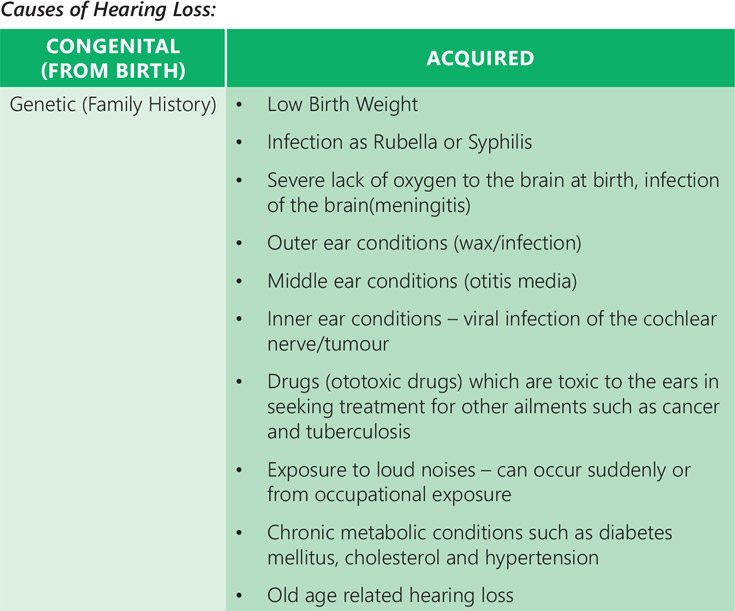World Hearing Day is held on 3rd March every year to raise awareness on how to prevent deafness and hearing loss and promote ear and hearing care across the world. Ear and hearing problems are among the most common problems encountered in the community as good hearing and communication are important at all stages of life.
According to the World Health Organisation, it is estimated that up to 1.5 billion people live with hearing loss. A person is said to have hearing loss if they are not able to hear as well as someone with normal hearing.
There are 3 types of hearing loss:
Conductive
● Caused by a problem in the outer ear or middle ear.
● Usually affects all frequencies to the same degree and is considered not severe.
Sensorineural
● Caused by a problem in the inner ear or auditory nerve.
● Sounds may appear distorted even with the use of a hearing aid.
Mixed
● A combination of conductive and sensorineural losses.



COMPLICATIONS OF DEAFNESS
● Communication difficulty
● Social embarrassment
● Low esteem
● Sense of isolation, frustration and loss of confidence
● Difficulty in Learning
HOW TO DETECT EARLY HEARING LOSS?
It is possible to measure hearing in babies as early as before one month of age. Hearing assessment should be done when hearing loss is suspected by your healthcare provider.
HOW IS HEARING LOSS MANAGED?
The role of an Audiologist is indispensable to detect the type of hearing loss using various methods of screening tests.
Children with congenital/early onset hearing loss should be enrolled into an early intervention programme as soon as possible to facilitate their language and cognitive development. Various communication options are available and will be facilitated by an Occupational Therapist and Speech Therapist.
The management of hearing loss depends on the type of hearing loss.
Conductive hearing loss
Most conductive hearing loss can be treated using medical or surgical treatment. Eg:
● Impacted wax – removal of wax
● Infection of the middle ear – medication or sometimes surgery
● Otosclerosis – ear surgery
● Hearing aids once medical/surgical treatment is complete and to improve the patient’s residual hearing
Sensorineural hearing loss
● Most sensorineural hearing loss is permanent and cannot be cured by medical or surgical treatment
● Management of sensorineural hearing loss include:
→ Hearing amplification
→ Through usage of properly fitted hearing aids
→ Cochlear implant may be indicated to those with severe hearing loss and those that do not benefit from hearing aids.
Mixed Hearing Loss
● A conservative approach but may include hearing amplification

Children with congenital/early onset hearing loss should be enrolled into an early intervention programme as early as possible to facilitate their language and cognitive development. Various communication options are available and will be facilitated by an Occupational Therapist and Speech Therapist.
HOW TO PREVENT HEARING LOSS
About 50% of cases with hearing loss can be prevented. It is also important to screen new-borns for high risk hearing loss as timely intervention and appropriate care can be sought out.
We recommend:
● Getting ear examinations and hearing checks regularly.
● Hearing screening for newborns.
● Turn down the volume on personal listening devices such as headphones and earbuds.
● Avoid loud noises whenever possible.
● Give your ears a rest and take periodic breaks from noise.
● Use hearing protection such as earplugs or noise-cancelling earmuffs.
● Avoid ototoxic drugs.
● Wear hearing protectors at high risk noise exposure environments.
● Limit the exposure time to noise such as loud music.
● Get ear examinations and hearing checks regularly.
Reference: World Health Organization’s World Hearing Day 2023 (March 3rd)
 Dr. Indirani Batumalay
Dr. Indirani Batumalay
Consultant ENT Surgeon
Columbia Asia Hospital – Bukit Rimau


